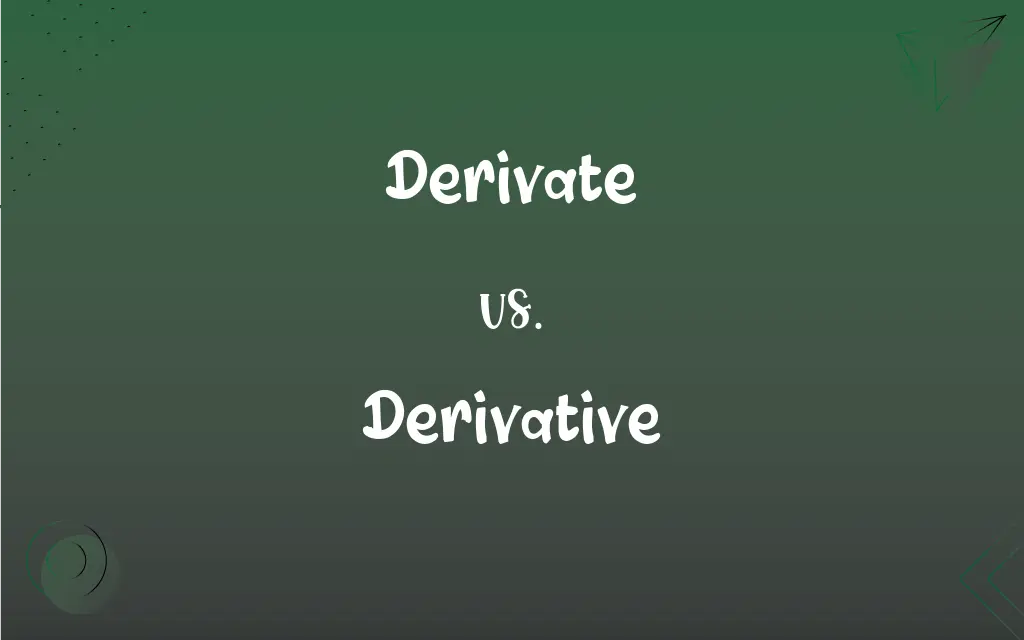Derivate vs. Derivative: What's the Difference?
Edited by Aimie Carlson || By Janet White || Updated on December 11, 2023
Derivate is less common, often meaning something derived, while derivative refers to something developed from something else or a concept in calculus.

Key Differences
A derivate typically refers to a product or substance formed from another, with a less frequent usage in modern English. In contrast, a derivative is more commonly used to describe something (like an artwork or idea) that has been developed from something else, or it refers to a financial instrument or a concept in calculus.
In chemistry, a derivate may denote a compound derived from a similar compound through a chemical process. A derivative, in the financial world, represents a security whose price is dependent on or derived from one or more underlying assets.
The use of derivate in literary or academic contexts is rare and often archaic, typically implying something directly obtained from something else. On the other hand, derivative is widely used in various fields like mathematics, where it denotes the rate of change of a function, and in literature and art to describe work that lacks originality.
Derivate, as a noun, is less versatile than derivative and is rarely used in everyday language. Derivative, however, is a multifaceted term, also used as an adjective, indicating something that has been derived, often with a connotation of lacking originality.
Both words share the root concept of deriving from something else, derivate is much less common and often limited in use, whereas derivative is a widely used term in various professional and academic fields, with diverse meanings.
ADVERTISEMENT
Comparison Chart
Common Usage
Rarely used, often in a chemical context
Common in finance, mathematics, and to describe lack of originality
Field of Application
Chemistry, archaic literary use
Finance, mathematics, literature, art
Function in Language
Mainly used as a noun
Used as both a noun and an adjective
Connotation
Neutral, indicating something derived
Can imply lack of originality when used as an adjective
Variety of Meanings
Limited, specific to derivation
Broad, applicable in various contexts
ADVERTISEMENT
Derivate and Derivative Definitions
Derivate
(Archaic) Directly obtained from something else.
The concept is a derivate of ancient philosophies.
Derivative
(Mathematics) The rate of change of a function with respect to a variable.
The derivative of velocity with respect to time is acceleration.
Derivate
Something derived from another source.
The new medicine is a derivate of traditional herbal remedies.
Derivative
Imitative of the work of another person.
His painting style is derivative of Van Gogh.
Derivate
A result of a process of derivation.
This artificial flavor is a derivate of natural extracts.
Derivative
Developed from something else; not original.
The film was criticized for being derivative of earlier works.
Derivate
(Chemistry) A compound made from a similar compound.
Aspirin is a derivate of salicylic acid.
Derivative
(Finance) A security with a price dependent on one or more underlying assets.
Stock options are a common type of financial derivative.
Derivate
A substance chemically derived from another substance.
Acetone is a derivate of propylene.
Derivative
Something that is based on another source.
This software is a derivative of an older program.
Derivate
Derivative.
Derivative
Resulting from or employing derivation
A derivative word.
A derivative process.
Derivate
Derived; derivative.
Derivate
Something derived; a derivative.
Derivate
(obsolete) To derive.
Derivate
Derived; derivative.
Derivate
To derive.
FAQs
What is a derivate in chemistry?
In chemistry, a derivate is a compound that is formed from a similar compound through a chemical process.
Are the terms derivate and derivative interchangeable?
No, they are not interchangeable; derivate is less common and often specific to chemistry, while derivative has broader applications.
What is a derivative in mathematics?
In mathematics, a derivative represents the rate of change of a function with respect to a variable.
Why is derivative important in calculus?
Derivatives in calculus are crucial for understanding rates of change and slopes of curves, fundamental in many areas of mathematics and physics.
Is understanding derivatives essential for investors?
Yes, understanding derivatives is important for investors, particularly those involved in complex financial markets and instruments.
Can derivative imply a lack of creativity?
When used as an adjective to describe art or literature, derivative can imply a lack of creativity or originality.
Is derivative always negative in connotation?
When used as an adjective, derivative can imply lack of originality, which can be negative, but in other contexts like finance or math, it is neutral.
What are common examples of derivatives in everyday life?
Common examples include stock options, futures contracts, and mortgage-backed securities.
Can derivate be used in everyday language?
Derivate is rarely used in everyday language and is more common in specialized fields like chemistry.
Can a derivate exist in literature?
While less common, a derivate in literature would imply a concept or idea derived directly from another source.
How is derivative used in finance?
In finance, a derivative is a security whose price is dependent on one or more underlying assets.
Can derivatives be used for risk management?
Yes, derivatives are often used for hedging or mitigating financial risks in various markets.
What is an example of a derivative in art?
A painting that closely imitates the style of a famous artist can be considered derivative in art.
Are there ethical concerns with using derivatives?
There can be ethical concerns, especially if derivatives are used in speculative or manipulative ways that can contribute to financial instability.
How does one identify a financial derivative?
A financial derivative can be identified by its dependency on the value of underlying assets like stocks, bonds, commodities, or market indexes.
Are derivatives complex financial instruments?
Yes, derivatives can be complex financial instruments, often requiring specialized knowledge to understand and trade.
What is the significance of derivatives in risk assessment?
Derivatives play a key role in risk assessment by allowing investors and companies to transfer or modify their risk exposure.
Do derivates have applications outside of chemistry?
While most commonly used in chemistry, derivates can be found in other fields, but their use is much less frequent than derivatives.
How do derivatives impact the economy?
Derivatives can have a significant impact on the economy by influencing investment strategies and risk management practices.
How has the use of derivatives evolved over time?
The use of derivatives has evolved significantly, becoming more complex and integral to modern financial markets and strategies.
About Author
Written by
Janet WhiteJanet White has been an esteemed writer and blogger for Difference Wiki. Holding a Master's degree in Science and Medical Journalism from the prestigious Boston University, she has consistently demonstrated her expertise and passion for her field. When she's not immersed in her work, Janet relishes her time exercising, delving into a good book, and cherishing moments with friends and family.
Edited by
Aimie CarlsonAimie Carlson, holding a master's degree in English literature, is a fervent English language enthusiast. She lends her writing talents to Difference Wiki, a prominent website that specializes in comparisons, offering readers insightful analyses that both captivate and inform.
































































